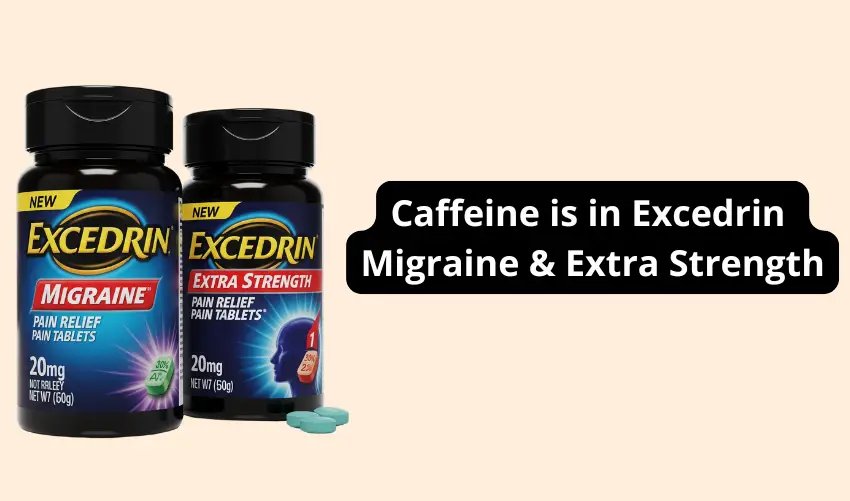This guide we’ll break down the caffeine content in both Excedrin Migraine and Extra Strength, and explore what that means for your headache relief. Get ready to empower yourself with the knowledge you need to tackle your pain more effectively.
Beyond Pain Relief: The Caffeine Factor
Excedrin Migraine and Extra Strength are popular choices for headache relief. But there’s more to these pills than just pain relief. Caffeine is a key player in their formula.
A Multi-ingredient Approach To Headaches
Excedrin formulations combine several active ingredients. They are designed for powerful relief of headaches and migraines. The main ingredients typically include:
- Acetaminophen
- Aspirin
- Caffeine
Acetaminophen and aspirin are both effective pain relievers. They work to reduce pain and inflammation. Caffeine plays a key role alongside these pain relievers. It enhances their effects.
The Unexpected Stimulant In Your Medicine Cabinet
Caffeine is often thought of as a morning pick-me-up. However, it is also present in common over-the-counter medications like Excedrin. This unexpected stimulant can surprise users.
Many individuals do not consider medications as sources of caffeine. Yet, the caffeine in Excedrin can have notable effects:
- Enhances pain relief from other ingredients
- Increases alertness
- May lead to side effects like jitteriness or insomnia
It’s important to monitor your total caffeine consumption. Health experts recommend keeping daily caffeine intake below 400 mg for most adults.
The Exact Caffeine Content In Excedrin
Knowing the exact caffeine content in these products helps users make informed choices. How much caffeine is in Excedrin? Let’s explore the details.
Per Pill Breakdown (65 Mg)
Each caplet or geltab of Excedrin Migraine and Extra Strength contains 65 mg of caffeine. This is a consistent amount across these specific formulations. Here’s a closer look:
| Product | Caffeine Content (per caplet/geltab) |
|---|---|
| Excedrin Migraine | 65 mg |
| Excedrin Extra Strength | 65 mg |
A typical adult dose of Excedrin is 2 tablets, which delivers 130 mg of caffeine. This amount is significant. Users need to keep track of their total caffeine intake from all sources.
- Excedrin Migraine: 65 mg caffeine per caplet
- Excedrin Extra Strength: 65 mg caffeine per geltab
- Typical dose (2 tablets): 130 mg caffeine
This caffeine content is essential for headache relief but can also add to daily caffeine totals.
Comparing Doses To Your Daily Brew
Excedrin’s caffeine content is comparable to that of coffee. A typical cup of brewed coffee (8-12 ounces) contains around 95 to 200 mg of caffeine. Thus, the caffeine in Excedrin plays a role in your overall consumption. Here’s a comparison:
| Caffeine Source | Caffeine Content |
|---|---|
| Excedrin (2 tablets) | 130 mg |
| 8 oz brewed coffee | 95 mg |
| 12 oz brewed coffee | 200 mg |
This highlights how medication can contribute significantly to caffeine consumption. For those sensitive to caffeine, this is an important consideration.

Why Caffeine Is In Excedrin: Mechanism Of Action
Caffeine acts as an “analgesic adjuvant,” enhancing the effects of other pain relievers. This guide explores how caffeine boosts pain relief and aids in migraine management.
Boosting Pain Relief
Caffeine enhances the effectiveness of acetaminophen and aspirin. Studies show that caffeine can make pain relievers up to 40% more potent for headaches. Here are some key points:
- Caffeine helps the body absorb pain relievers faster.
- It can prolong the effects of pain medications.
- Patients report quicker relief when caffeine is included.
The synergy between caffeine and pain relievers creates a powerful solution for those suffering from migraines. A study comparing pain relief shows:
| Medication | Pain Relief Effectiveness |
|---|---|
| Aspirin Alone | Moderate |
| Acetaminophen Alone | Moderate |
| Aspirin + Caffeine | High |
| Acetaminophen + Caffeine | High |
This evidence supports caffeine’s role in maximizing pain relief, making Excedrin an effective choice for migraine sufferers.
Vasoconstriction And Migraine Relief
Caffeine is a vasoconstrictor, meaning it narrows blood vessels. This action can help combat headaches, particularly migraines. During a migraine, blood vessels may widen, leading to increased pain. By constricting these vessels, caffeine helps reduce headache intensity. Here are the main benefits:
- Reduces blood flow to the brain.
- Helps relieve headache symptoms quickly.
- Alleviates caffeine withdrawal headaches.
Studies indicate that caffeine can enhance the overall effectiveness of migraine treatments. Caffeine’s vasoconstriction effect is especially beneficial during a migraine.
Managing Caffeine Intake With Excedrin: Risks & Considerations
Managing caffeine intake is crucial. Too much caffeine can lead to side effects and health risks. Understanding these risks and considerations helps ensure safe use of Excedrin.
Potential Side Effects Of Excess Caffeine
Excessive caffeine consumption can lead to several side effects. While caffeine can help with headache relief, it may also cause discomfort. Here are some potential side effects:
- Nervousness
- Irritability
- Restlessness
- Sleeplessness
- Increased heart rate
- Anxiety
- Occasionally rapid heartbeat
These side effects can worsen existing conditions like anxiety. Users should monitor their overall caffeine intake. Limiting other caffeine-containing foods, beverages, or medications is wise.
Important Interactions And Warnings
Caffeine can interact with certain medications. It is essential to consult a doctor if taking other medications that interact with caffeine. These may include:
- Certain antibiotics
- Sedatives
Understanding how caffeine affects your health is vital. It can contribute to rebound headaches if taken too frequently. Be aware of the maximum daily dose for Excedrin. This helps avoid acetaminophen or aspirin overdose.
